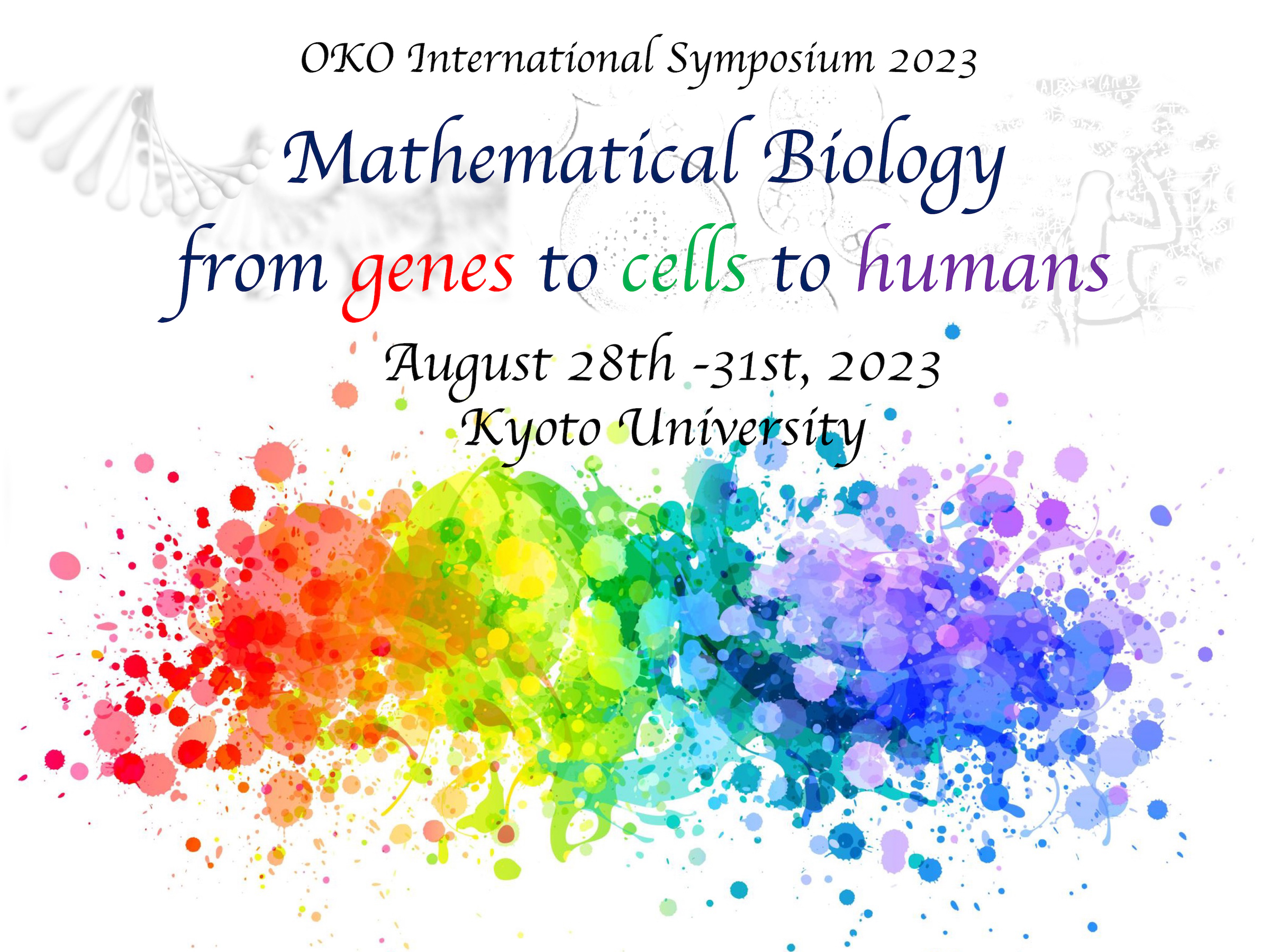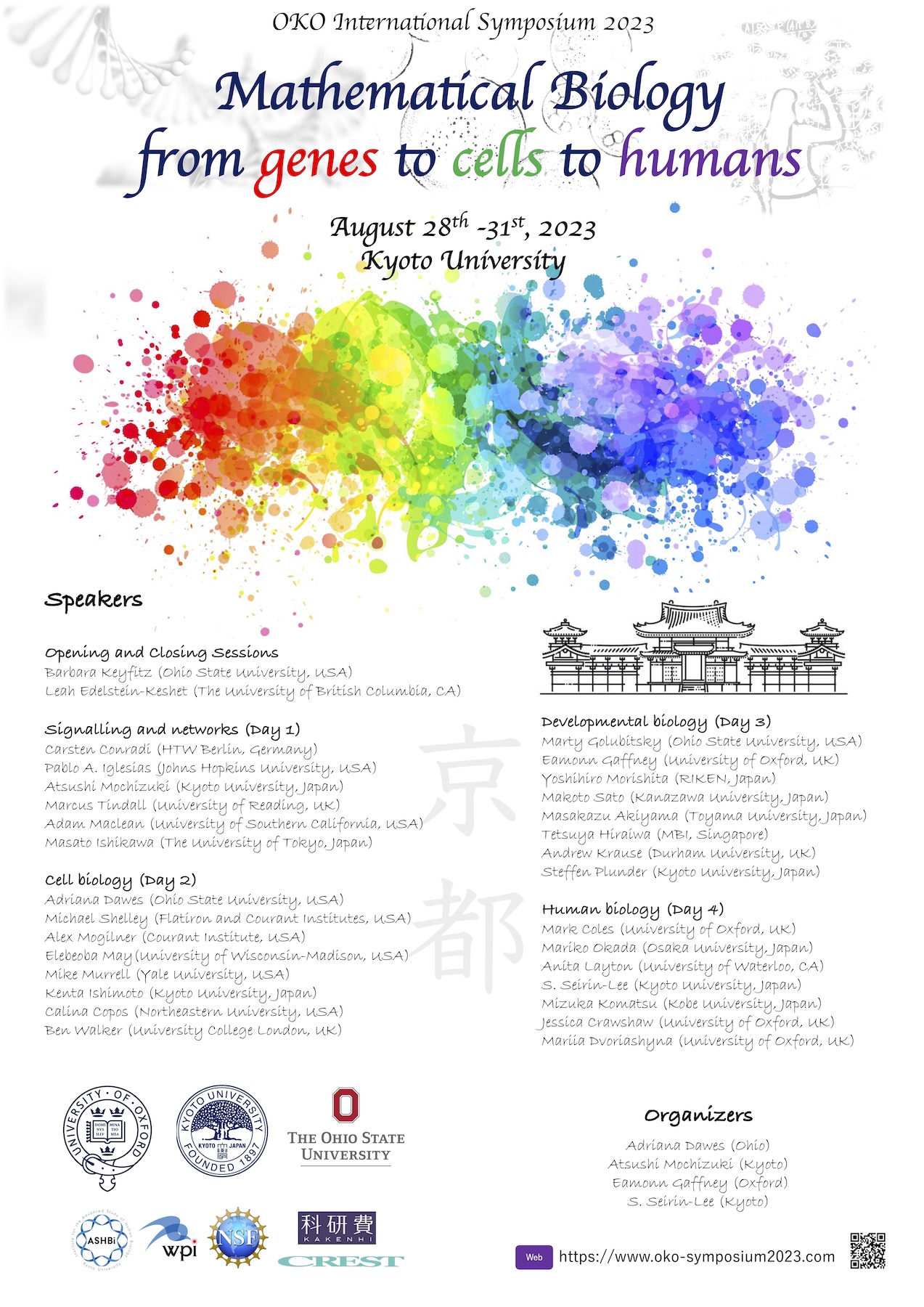Events

- August 28, 2023
- August 31, 2023
OKO International Symposium 2023 – Mathematical Biology from Genes to Cells to Humans
Welcome to the OKO Symposium 2023
(new!) Early registration has been extended by June 30(JST), 2023.
The developmental process of life is an orchestra that produces a beautiful harmony of temporal and spatial dynamics of all living units, including genes, cells, tissues, and organs. This symposium aims to share cutting-edge research results in mathematical biology in various life and medical topics ranging from genes to cells to humans, and to provide an opportunity to explore the next generation of mathematical biology.
Official website
OKO Sympoisum 2023 - Mathematical Biology from Genes to Cells to Humans
Basic Information
- Date:
- August 28 (Mon) – August 31 (Thu)
- Venue:
- Kyoto University, Shirankaikan
- Language:
- English
- Registration Fee:
- Early registration by June 30
May 31(JST)...(Students) 4000 JPY / (Others) 10,000 JPY
Late registration(from June 1)by July 31(JST)...(All) 16,000 JPY
[note] Registration will close at 24:00 on July 31(JST), 2023.
[note] We may close earlier when the capacity reached to the limit.
Registration
Pre-registered participants only
Official registration for OKO International Symposium 2023
Program
Day 1 – 28 August (Monday)
| 9:00– | Reception |
| 10:20–10:30 | Opening Remark |
Opening Session – Mathematics in mathematical biology
| 10:30–11:30 | Barbara Keyfitz | The Ohio State University What hyperbolic partial differential equations can tell us about phenomena in biology |
| 11:30–11:40 | Short Break (10 min) |
Session Day 1 – Signalling and networks: from genes to cells
| 11:40–12:20 | Pablo A. Iglesias | Johns Hopkins University The threshold of excitable systems governs wave behavior and cellular morphology |
| 12:20–13:00 | Marcus Tindall | University of Reading Small versus large models: Understanding the global and local control dynamics of biological networks |
| 13:00–14:40 | Lunch Break (100 min) |
| 14:40–15:20 | Atsushi Mochizuki | Kyoto University Biological function and functional module originated in structure of network |
| 15:20–16:00 | Carsten Conradi | HTW Berlin Monomial parameterizations in the analysis of biochemical reaction networks |
| 16:00–16:30 | Coffee Break (30 min) |
| 16:30–17:00 | Adam Maclean | University of Southern California Inferring the gene regulatory network dynamics that control cell fate decisions |
| 17:00–17:30 | Masato Ishikawa | Kyoto University Inference of gene regulatory networks based on expression dynamics induced by gene perturbations |
Day 2 – 29 August (Tuesday)
| 9:00–10:00 | Morning free discussion |
Session Day 2 – Cell biology: from math to cellular biophysics
| 10:00–10:40 | Michael Shelley | Flatiron and Courant Institutes Active Matter and Transport in Living Cells |
| 10:40–11:20 | Alex Mogilner | New York University Rapid and accurate assembly of mitotic spindle |
| 11:20–11:50 | Calina Copos | Northeastern University The theory of the cell motility mechanism in the absence of adhesions |
| 11:50–13:30 | Lunch Break (100 min) |
| 13:30–14:10 | Adriana Dawes | The Ohio State University Unraveling the mechanochemical network regulating centrosome dynamics in the early C. elegans embryo |
| 14:10–14:50 | Kenta Ishimoto | Kyoto University Microswimming by odd elasticity |
| 14:50–15:20 | Benjamin J. Walker | University of Bath Emergent rheotaxis of shape-changing swimmers in Poiseuille flow |
| 15:20–15:50 | Coffee Break (30 min) |
| 15:50–16:30 | Michael Murrell | Yale University The mechanics of convective cell motion |
| 16:30–17:10 | Elebeoba May | University of Wisconsin-Madison Multicellular and Multiscale Models of Infection Response |
| 17:10–18:30 | Poster Session |
| 18:30–20:30 | Networking with Banquet Dinner |
Day 3 – 30 August (Wednesday)
| 9:00–10:00 | Morning free discussion |
Session Day 3 – Developmental biology: from cells to organism
| 10:00–10:40 | Martin Golubitsky | The Ohio State University Homeostasis in Input-Output Networks |
| 10:40–11:20 | Tetsuya Hiraiwa | Academia Sinica Dynamic Self-Organization of Migrating Cells |
| 11:20–11:50 | Steffen Plunder | Kyoto University The directionality of cell extrusion as a clue to study epithelial-to-mesenchymal transitions |
| 11:50–14:20 | Lunch Break (150 min) |
| 14:20–15:00 | Makoto Sato | Kanazawa University Tiling mechanisms of the compound eye through geometrical tessellation |
| 15:00–15:40 | Eamonn Gaffney | University of Oxford Aspects of modelling self-organisation in development |
| 15:40–16:10 | Andrew Krause | Durham University Conceptualizing Mechanistic Hypotheses in Morphogenesis via Dynamical Systems |
| 16:10–16:40 | Coffee Break (30 min) |
| 16:40–17:20 | Masakazu Akiyama | University of Toyama A three-dimensional vertex dynamics model for understanding the twisting phenomenon of the hindgut of Drosophila |
| 17:20–18:00 | Yoshihiro Morishita | RIKEN Coding design of positional information in developing tissues and a spacetime coordinate for capturing the essential dynamics of morphogenesis |
Day 4 – 31 August (Thursday)
| 9:00–10:00 | Morning free discussion |
Session Day 4 – Human Biology: translating science to clinic
| 10:00–10:40 | Mark Coles | University of Oxford Combining Experimental, Systems and Computational approaches to accelerate and de-risk immunotherapy development for cancer, infectious disease and inflammatory disease |
| 10:40–11:20 | Anita Layton | University of Waterloo His and Her Mathematical Models of Physiological Systems |
| 11:20–11:50 | Mizuka Komatsu | Kobe University Algebraic approaches to quantitative modeling of dynamic biological systems |
| 11:50–13:30 | Lunch Break (100 min) |
| 13:30–14:10 | S. Seirin-Lee | Kyoto University Mathematical Dermatology linking Eruption Morphology and Skin Disease |
| 14:10–14:40 | Mariia Dvoriashyna | University of Edinburgh Aqueous Humour Production: A Mathematical Model |
| 14:40–14:50 | Short Break (10 min) |
| 14:50–15:20 | Jessica Crawshaw | University of Oxford The important role of hierarchical Bayesian inference in understanding macular degeneration treatment strategies |
| 15:20–16:00 | Mariko Okada | Osaka University A Computational Platform for Patient-specific Modeling |
| 16:00–16:30 | Coffee Break (30 min) |
Closing Session – Mathematical Biology, current perspectives and future prospects
| 16:30–17:30 | Leah Edelstein-Keshet | The University of British Columbia) Mathematical biology of motile cells, past, present, and future |
| 17:30–18:00 | Closing remarks |
Organizers
- Adriana Dawes | Ohio State University, USA
- Atsushi Mochizuki | Kyoto University, Japan
- Eamonn Gaffney | University of Oxford, UK
- S. Seirin-Lee | Kyoto University, Japan
Contact
- ASHBi Math Group
- ashbi-math[*]mail2.adm.kyoto-u.ac.jp
(Please change [*] to @.) - Postal address: Institute for the Advanced Study of Human Biology (ASHBi)
Faculty of Medicine Bldg. B, Kyoto University
Yoshida-Konoe-cho, Sakyo-ku, Kyoto 606-8501, Japan

